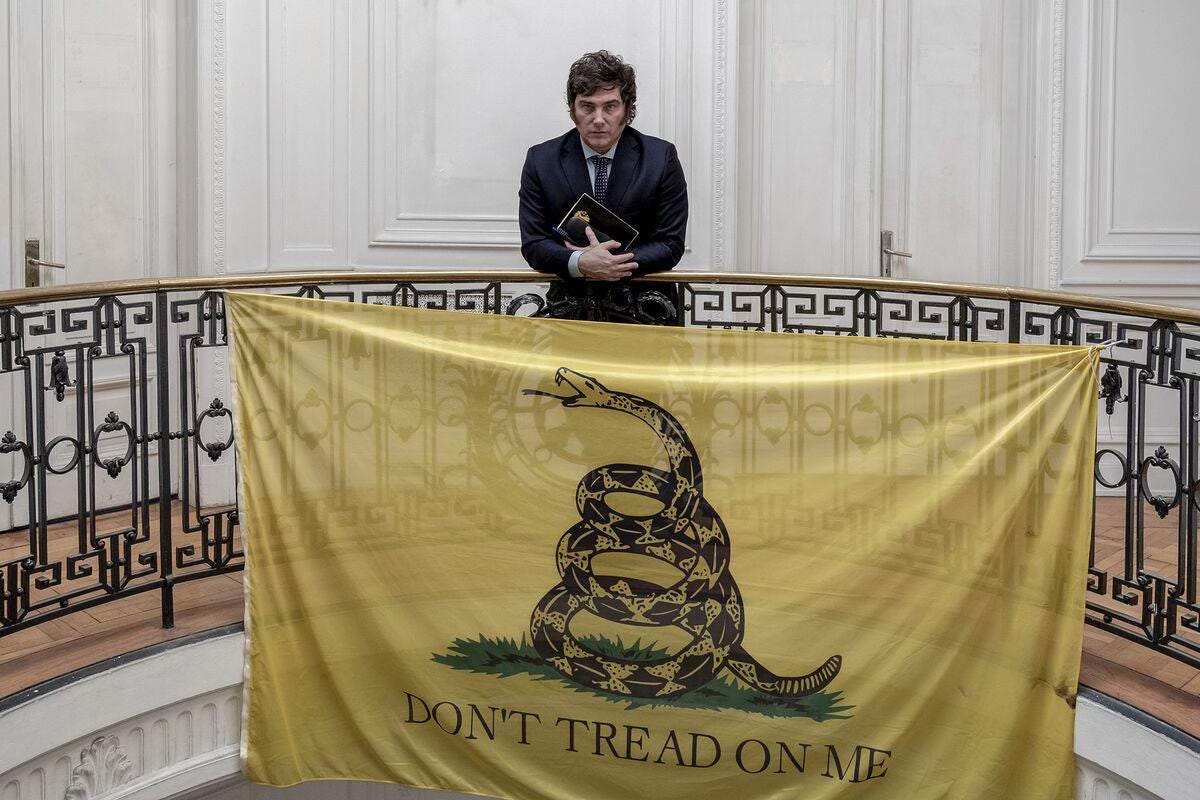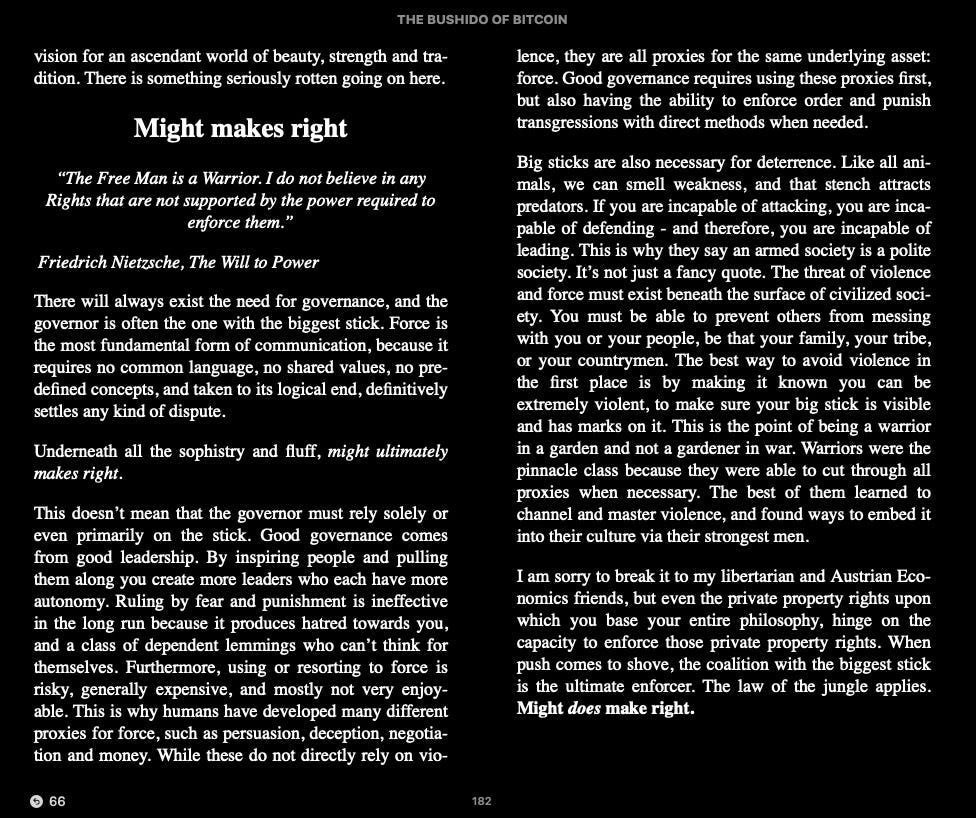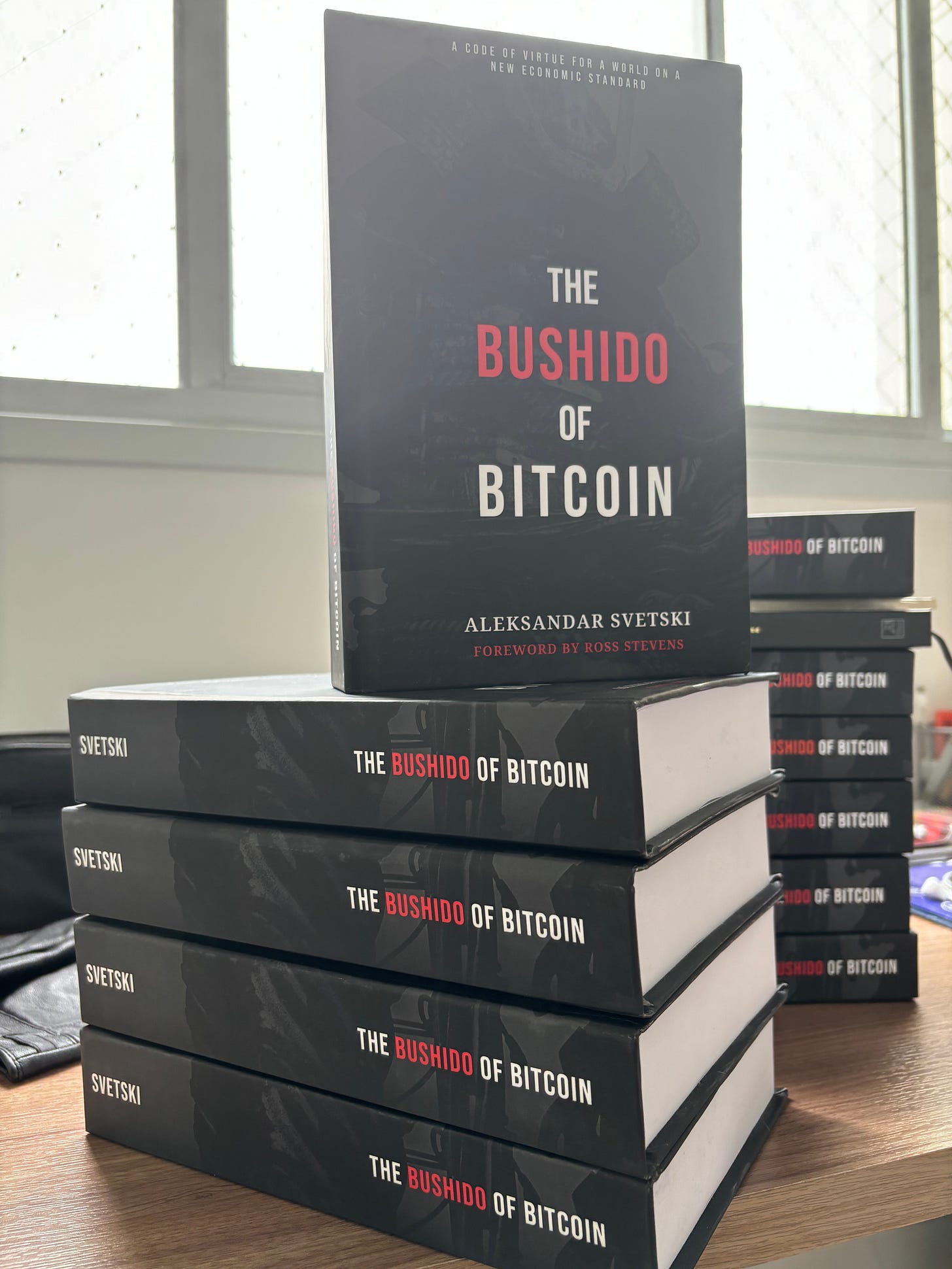Intro
This is the second in a series of four mini-essays on why I’ve moved beyond freedom, libertarianism and the economically sound Rothbardian anarcho-capitalism… and what I think comes next. Last week I kickstarted this series with why I no longer believe in freedom. Here I continue my reasoning ‘out loud’.
Let’s start with a logical problem.
If you hold freedom as the highest value (as I did for years) you should take this judgment to its logical conclusion. In the case of politics, this means you should regard Anarchy – the absence of a State – as the only form of social organization which fulfills your values. Yet most people who claim to be freedom maxis never take the step of declaring themselves anarchists; or if they do, they hardly mean it.
If you’re a minarchist, you can’t simultaneously claim that freedom is your highest value, since you’re willing to sacrifice some of that freedom (like your capital in the form of taxation) to obtain something else, the provision of certain services by the State: security, infrastructure, perhaps some identitarian cohesion, etc.
This is to reinforce the point I made last week that freedom maximalism is often not a position held with conviction, but rather a fluffy concept to make oneself feel good and righteous, or a metaphysical ideal that doesn’t map onto practical reality very well.
Several key insights have opened my eyes to the fact that Anarchy (I’m talking in the Rothbardian sense, not the retarded leftoid sense) is not viable in practice, especially not for sustained periods.
Precisely because of this, I cannot simultaneously hold the position that freedom is the highest value. If its ultimate political manifestation is impracticable or even undesirable, how can the principle that sustains it be the highest?
The problem with the NAP
Let’s start by defining Anarchy. The word comes from the Greek:
ἀν- (an-): a prefix meaning “without” or “not.”
ἀρχος (arkhos): meaning “ruler.”
The relationship between freedom and anarchy is that, when defining freedom as ‘absence of coercion’, any form of State, which is an apparatus of coercion, runs counter to freedom. For instance, Murray Rothbard defined the State as an institution that:
funds itself through force (taxation)
exercises a monopoly of violence (defense) over a given territory.
To Libertarians, the Non-Aggression Principle (NAP) is sacred. If freedom is ‘absence from coercion’ then it follows that a ‘free’ society would uphold the NAP. It follows, too, that the only form of social organization that fundamentally upholds the NAP would be Anarchy.
The NAP, however, has a very obvious limitation: to be a useful framework for cooperation, it requires that everyone subscribe to it. In other words, the NAP breaks down as soon as a significant number of actors choose to violate it – exactly like any other kind of tacit cultural framework (hint: they must be defended).
Also, as it turns out…
Force is the universal language
The reality of the world is that Might Makes Right, and he who carries the biggest stick (more money just buys you a bigger stick) calls the shots. When push comes to shove, and you dig beneath all the negotiations, commerce, economics, division of labor and politics, what you find is… force.
This doesn’t mean that I advocate using force all the time, or that you must rule or lead by force – that’s not only stupid, but uncivilized. Of course it’s much better to live under a government which respects your private property, doesn’t dilute your savings and doesn’t jail you arbitrarily for no reason. But the key here is to NOT ignore the fact that force underlies it all. And if you do not have the ability to exert force, you are done, finished, screwed. How do you even restrict your own government if you’re harmless?
I deal with this problem at length in The Bushido of Bitcoin, particularly in this chapter which was written to jolt people out of the malaise of modern comfort:
Ignoring this fact of life just opens you up to being overrun by those who exist at more uncivilized levels (precisely what’s happening to the West today).
The Territorial Imperative
Add to this the Territorial Imperative: claiming ownership of space is one of our most deeply ingrained instincts, perhaps more so than sex and procreation.
Rothbard recognized that the State is fundamentally a jurisdiction over a Territory. Private property is the same: ownership of space. In fact, the reason I believe private property is the cornerstone of civilization is less because of the Austrian arguments (which are theoretically sound) but more because I understand property as a manifestation of our biological territorial imperative. Private property works not because we ‘said’ it should, but because God designed it that way: it’s in our DNA. (Note: Bitcoin takes that instinct into the digital realm, which is why it’s so powerful).
So how does that territorial imperative reconcile with anarchy? Well… the Rothbardian answer lies in the absolute sanctity & right of private property. I agree here too. In theory it all makes sense…
But!
In practice, your territory or property is only that which you can effectively defend. In other words, territory belongs to whomever can exert the necessary force over it. That’s just an inescapable fact. Yes, cooperation insofar as it is certainly preferable, both socially and economically, to conflict (you’re better off trading with your enemy than killing them off) is also ultimately most helpful to demarcate and defend your territory and domain: be that your home, city or country.
You simply have better odds if you cooperate on defense too. You may own many guns, but how many can you fire at the same time? You need your family, kin, your people to defend the territory you hold in common and cherish.
When you acknowledge that, the next thing that becomes obvious is that, as the population grows and the territory expands, disputes will become more frequent. If order and cohesion, which are possible at smaller scales, are to be maintained at larger scales, Authority, and therefore some kind of rule or ruler are necessary. You very quickly need mechanisms of arbitration, on top of defense against foreign threats. This leads to… yes, a State (I’ll examine some kinds in the next essays).
In Closing
Without rule, a territory lacks cohesion and without authority, social rule cannot exist. We are not all computer programs that just do what we’re told or ‘the one right way’, because often, many variable ways exist. An-archy is a transient state, a massive vacuum, that WILL be filled - and if not by competent authority, then most likely by those who are sympathetic neither to your ‘rights’ nor moral frameworks.
Libertarians and utopians love making perfect the enemy of the good… I’d prefer we be realistic instead and recognise that:
Practice trumps theory, and Anarchy is not very viable in practice. (Even anarcho-capitalism is not, unless we made EVERY culture a carbon copy of classical America. Maybe that’s a good idea... for another essay)
Eventually someone or some group is going to establish order and authority over a Territory. Will it be you / your kin or some hostiles from the third world?
Knowing this, we should stop wasting time arguing about theoretical nonsense and instead be asking practical questions like what kind of State should exist, who should lead it, and what kind of men does it take to prevent ruler from abusing the ruled?
I can guarantee you this much: If the good and strong among us do not step up and establish good governance, the parasites will rise up and fill the void.
If this reasoning puts me in the category of “statist” then so be it. I prefer to be like Milei than Rothbard or Hoppe, because while the latter, whose ideas are inspiring (credit where credit is due) only implemented their ideas on paper, the former is someone who supports those same ideas, but recognises that implementing in real life requires more.
In part 3 of this series, I will address Democracy and why, even though a State is a necessity, it has been so detrimental and destructive to the West. Stay tuned!
Aleksandar Svetski
I’ll be doing more of these short-form essays as I explore the core themes from The Bushido of Bitcoin and prepare to write the second book in the Bushido series: The Metaphysics of War & Beauty.
If you’re interested in this kind of content, subscribe and share this with anyone you think might also find it valuable.
And if you want to support my work, please pick up a copy of The Bushido of Bitcoin on Amazon, or directly from me for Bitcoin.









Hey Aleks. Glad to see you thinking through this. Can't say I understand it all or add much commentary, but the title is excellent and I believe it is true! Cheers
Good piece! I didn‘t know the greek root, interesting.
Refreshing to hear said out loud that one can only truly own something that one is also capable defending as its never articulated in MSM. It’s also obviously true which we can observe in russian aggression.
I‘m aligned with Svetski‘s view of anarchy as waiting to be being filled.
I did write a review of Bushido of Bitcoin (in Medium) and although there are details to disagree with, I‘m overall more aligned with his philosophy than most modern writers.